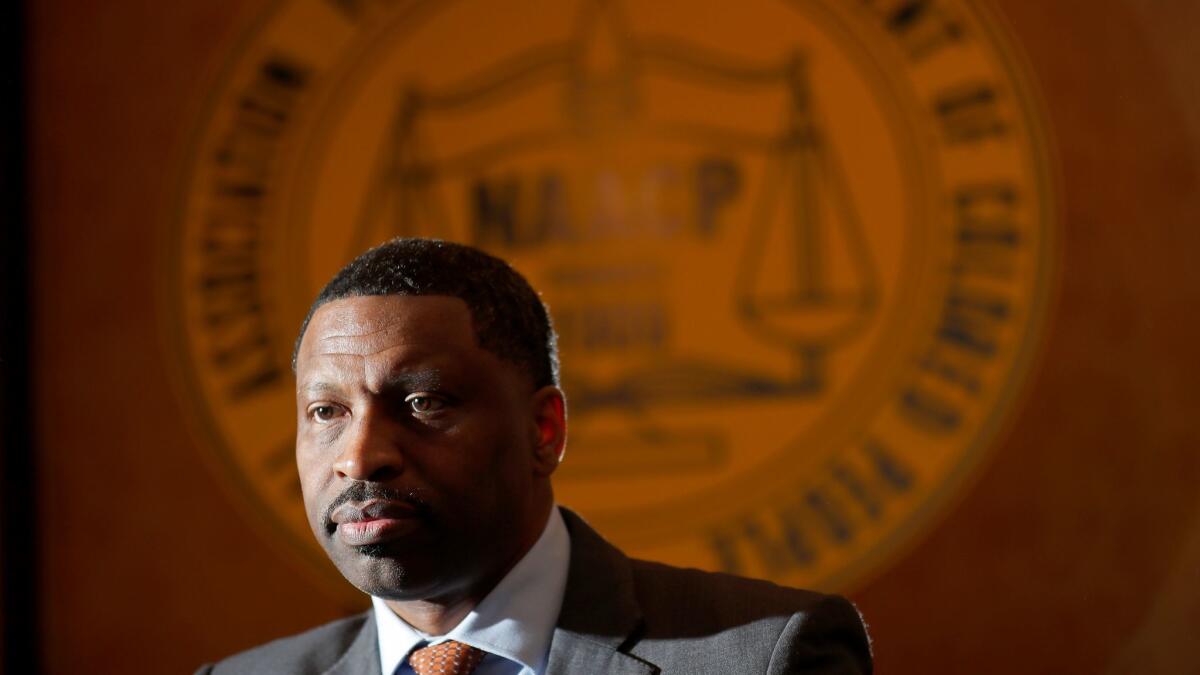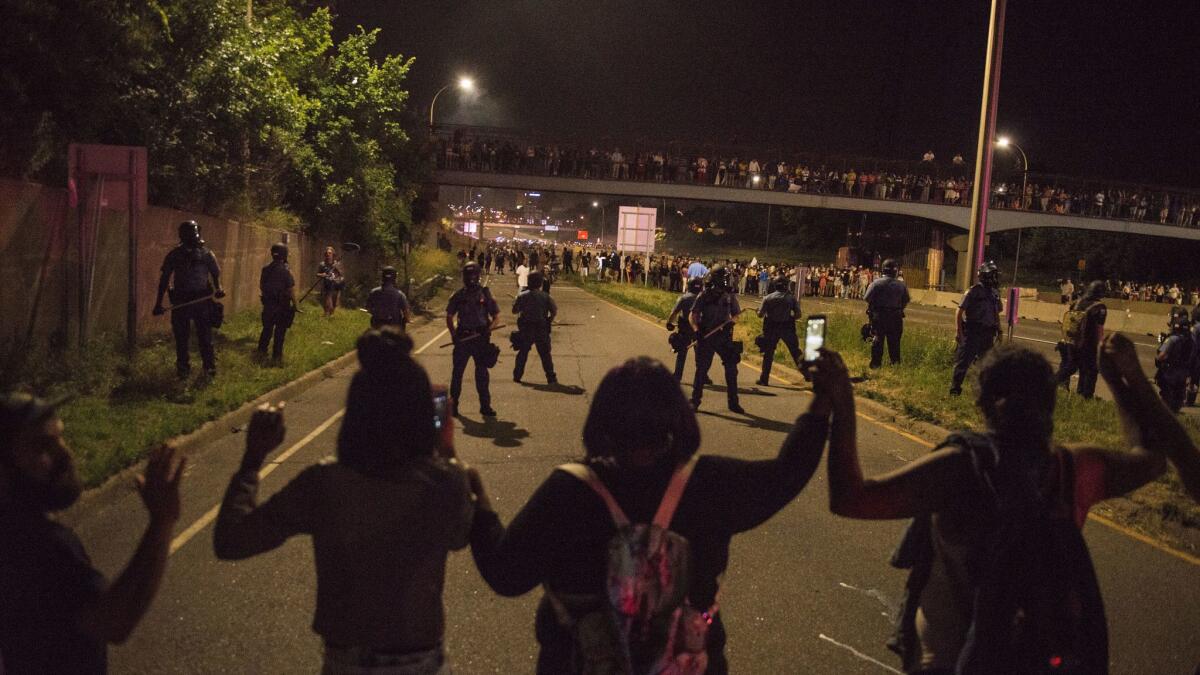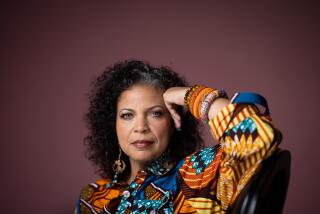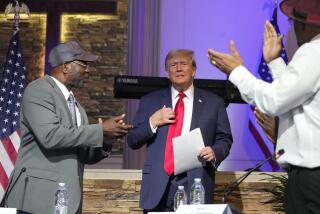Can the NAACP save itself? With viral protests and new leadership, a storied group tries to reinvent

When the most prominent African American civil rights group recently issued a nationwide warning against flying on American Airlines, it was a surprising move for an organization known more for slow-moving lawsuits than public confrontation with major corporations.
Leaders of the National Assn. for the Advancement of Colored People said they were following tradition in standing up to the company after investigating a series of complaints that it had discriminated against black passengers who were removed from flights or had their seats downgraded against their will. The airline shot back, calling the accusation disappointing and saying it did not “tolerate discrimination of any kind.”
Civil rights historians and activists say the rebuke of one of the nation’s biggest corporations is part of a growing effort by the 109-year-old organization to reboot. It follows years of complaints that it has become out of touch as social-media-fueled movements like Black Lives Matter ignite protest and policy change.
Derrick Johnson, president of the NAACP, talks Trump, voting rights and NFL protests »
“NAACP has had extraordinary success in local issues but nationally it’s faded,” said Craig Wilder, a historian who studies race at the Massachusetts Institute of Technology. “This is a critical period where it has to reinvent itself.”
When black and white activists in New York founded it in 1909, the NAACP was largely focused on fighting against the wide-scale lynching of African Americans. Within a decade, it had tens of thousands of members around the U.S. One of its first major triumphs came in 1930, when it persuaded senators to block the nomination of a judge to the Supreme Court because of his negative views on civil rights.
In the decades after that, the group turned aggressively to protests and lawsuits. It was prominent in Brown vs. Board of Education — the landmark 1954 Supreme Court decision that led to the desegregation of schools — and helped usher in the Civil Rights Act of 1964 and the Voting Rights Act of 1965.
But in recent years it has hit setbacks over finances, leadership and a growing chorus of critics attacking its relevance.
The spat with American Airlines was the latest flashpoint for the organization in its months-long attempt to reset.
In May, the group abruptly ousted its president, saying it needed to be more “vigilant and agile” in “challenging times,” and announced a national listening tour. In August, it issued a travel advisory against Missouri, citing a new state law that made it harder to sue for employment and housing discrimination, as well as recent hate crimes and complaints about police treatment of minorities. It warned African Americans and other racial minorities of “looming danger” if they crossed into the state.
Last month, the civil rights group named Derrick Johnson, the former head of its Mississippi conference and interim leader since the summer, as president. Johnson announced the organization would switch from a 501(c)3 to a 501(c)4 nonprofit in order to have more leeway to take part in political lobbying under federal law.
“The Trump administration has presented certain challenges. The political landscape is much more aggressive around racial issues,” Johnson said in an interview.
He said that the Trump presidency had fueled white supremacy and that the group had found some success in funneling disappointment in the president’s relationship to minorities into membership. Johnson would not reveal membership numbers, but the group, which once boasted of having hundreds of thousands of people on its rolls, is smaller today. Citing a membership bump after the election, NAACP representatives said they expected a 4% increase through the end of the year.
The NAACP does retain a broad swath of supporters. A 2016 Pew Research Center survey found that about three-quarters of African Americans said it was either “very” or “somewhat” successful in helping blacks gain equality. Black Americans were more likely to know about the group than about the National Urban League or the Congressional Black Caucus, and gave it better ratings.
By comparison, the survey found that 65% of African Americans strongly or somewhat supported Black Lives Matter, and 59% believed the movement would be effective in the long run.
The NAACP, whose chapters around the U.S. have long been involved in politics, has made marks at the local level in some areas. Over the years in North Carolina, a former state conference president, the Rev. William Barber II, waged a high-profile campaign against voting restrictions that disproportionately hit black residents. Barber, who handed off his position to a new state president last month, was also a prominent speaker at last year’s Democratic National Convention.
In Georgia and Alabama, NAACP chapters have also launched lawsuits against voting rules. In January, former NAACP President Cornell Brooks was arrested as he staged a sit-in at then-Sen. Jeff Sessions’ office to protest the Alabama Republican’s nomination as attorney general.
But the critics have been sharp. They point to the group’s national leadership — three presidents in less than a decade — as unstable. When protests broke out last year in Baton Rouge, La., and St. Paul, Minn., over deadly police shootings of black men, chapters complained about arduous NAACP rules that required the national office to approve demonstrations. Though it has more than 2,000 chapters across the U.S., critics say they are too slow to hit the streets.

In a scathing New York Times opinion piece this year that circulated at the organization’s headquarters in Baltimore, African American political historian Melissa Harris-Perry said the NAACP had been “irrelevant for far too long.” Perry said it needed to “return to the bloody years” when its leaders were the prime foes of white supremacists like the Ku Klux Klan and lawmakers who supported segregation.
Genna Rae McNeil, an African American history professor at the the University of North Carolina at Chapel Hill, said the sentiment is widely felt.
“They have been doing education, youth outreach and voter registration, but we are in a period of greater crisis at this point when people’s lives are in jeopardy. We are in the ‘black lives don’t matter’ period,” McNeil said. “There is a pressing need for an organization like NAACP to be in the trenches as much possible right now in the fight for racial justice.”
In Los Angeles last month, Johnson and other NAACP officials fielded similar critiques during 90 minutes of questions at a town hall listening session featuring members from California, Hawaii and Arizona.
A.J. Ali, a filmmaker in Southern California, said the NAACP hadn’t done enough to bring police and African Americans together.
“The NAACP has been absent in bridging the divide. What is being done on the national level and what can be done on the local levels …? How can we partner with the NAACP to improve police-community relations?” he asked.
Felicia Jones, a member of the San Francisco NAACP, said the group needed to focus on fewer issues.
“I know that we are bombarded with things, but we have to have some stick-to-it-ness. We have to have some stick-to-it-ness with the issues that are facing our people, and one is mass incarceration — the other is police brutality,” Jones said.
Darrell Goode, president of the Santa Monica/Venice NAACP branch, said the biggest focus should be challenging the president. African Americans have given Trump some of his lowest approval ratings. His reputation among community leaders took a beating after he doubled down on describing some of the white supremacist marchers in Virginia over the summer as “very fine people.”
“We got President Moron doing everything to set us back,” Goode said.
In an interview, Johnson said he was keeping a close eye on the president, and that the tour was part of an ongoing process as NAACP leaders evaluate priorities.
“At the NAACP,” he said, “we must step up to be that voice for communities who may not have voices.”
Times staff writer Kurtis Lee contributed to this report.
Jaweed Kaleem is The Times’ national race and justice correspondent. Follow him on Twitter, Facebook and Instagram.
ALSO
American Airlines and NAACP meet to discuss allegations of racism
Mary J. Blige, Jay-Z lead NAACP Image Award nominees
The elections brought a slate of diverse candidates into office
Is it OK to mention a person’s immigration status in court? Washington state says no
More to Read
Sign up for Essential California
The most important California stories and recommendations in your inbox every morning.
You may occasionally receive promotional content from the Los Angeles Times.











